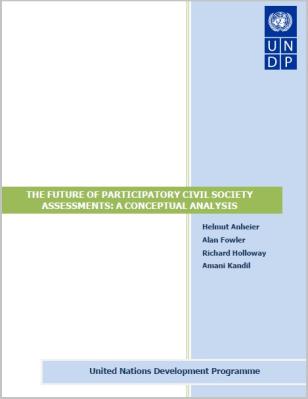The Future of Participatory Civil Society Assessments: A Conceptual Analysis

English
DownloadThe Future of Participatory Civil Society Assessments: A Conceptual Analysis
November 3, 2015
Building on the progress made in civil society assessments since 2000, there is a common understanding that the time is right for a next generation of assessment tools. These new tools will address important fundamental issues of philosophy, principle and methods. The Future of Participatory Civil Society Assessments: A Conceptual Analysis (2011) aims to contribute to the discussion between different stakeholders on future approaches in participatory civil society assessments by answering the following key questions:
1) What are the key strengths and weaknesses of the current tools used to assess civil society?
2) What should an ideal participatory civil society assessment look like in the future?
3) How can participatory civil society assessments help in improving governance at the local level as well as transversally (e.g. through a comparative and cross-national assessment)?
4) Can these assessments be used more strategically by various stakeholders?
5) How can this happen in the future?
This analysis presents four forward-looking pieces by leading academics and practitioners in this field who are Helmut Anheier, Alan Fowler, Richard Holloway and Amani Kandil. Each of the contributing authors focuses on specific areas. Helmut Anheier brings a primarily technical lens to this review and recommendations. His paper tracks the main civil society assessment methods and analyses whether they indeed capture and generate the data they have set out to do. Richard Holloway focuses on the implementation process of assessments, as this has often proven to be at least equally important to the data it has gathered. Both authors examine whether or not the processes adopted achieved the active participation of stakeholders and promoted ownership as planned.
Amani Kandil and Alan Fowler approach the analysis from a political angle. Civil society is through these assessments to be recognized principally as a political agent of change, specific to each cultural context. International and comparative civil society assessments when implemented in non-western countries face an added challenge. Hence, according to this discussion, it is important to take into account the culturally specific conditions in the methodology and implementation approach.

 Locations
Locations